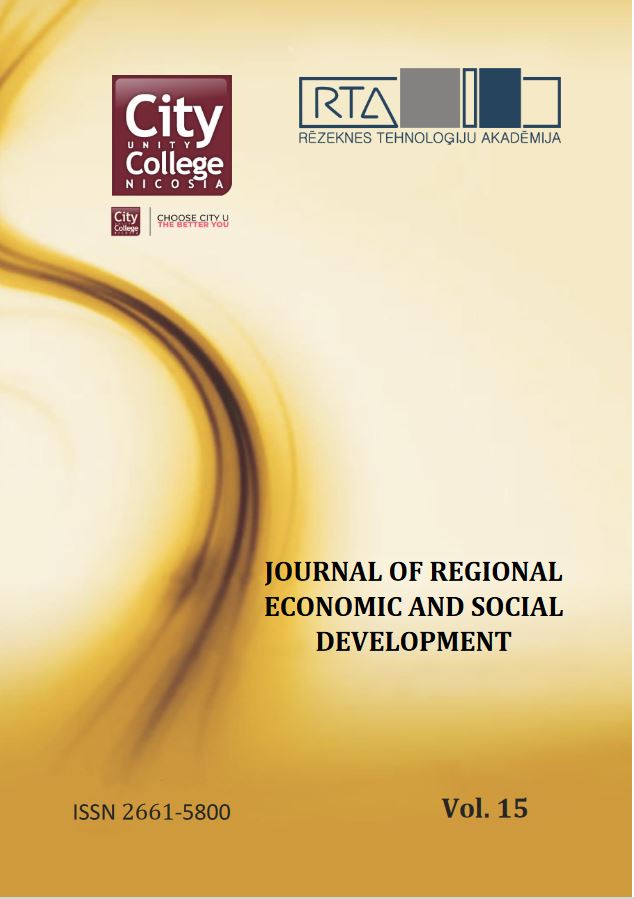ANALYSIS OF THE STARTUP EXPERT SURVEY RESULTS IN LATVIA
DOI:
https://doi.org/10.17770/jresd2023vol15.7341Keywords:
start-up, expert, surveys, economic, entrepreneurshipAbstract
Purpose and aim of the study: The aim of the research is to assess the environment of start-ups in the Latvian business and to find out the opinion of startup experts about factors influencing the start-ups. The tasks of the research are the following: Carry out a theoretical analysis of information about Latvian start-ups; To select and take the survey from experts of startups; To summarize results of surveys. Research period – December 2022 until February 2023.
Design / Methodology / Approach: General scientific research methods used in the research: the monographic or descriptive research method, survey method and non-parametric statistic for rank correlation method Kendall's W (Kendall's coefficient of concordance).
Main Findings: In research author concludes that the most important factors, which affects startups are financial management and finding/solving the real problem of the customer. Almost half of respondents considers that the regulatory framework in Latvia is complicated. Author concludes that strategic management skills and financial competencies are the most important competencies to start new entrepreneurship. In the performed calculation experts are relatively unanimous.
Originality: The originality of the research is based on the increase the total number of startups and the dynamic development of start-up companies in Latvia. So far there are just few scientific articles in Latvia about the topic of start-ups. Startup expert interviews are very important in the industry, in order to evaluate the environment of startups.
Implications: The article will promote startup research in Latvia.
References
Sreenivasan, A. & Suresh, M. (2023). Readiness of financial resilience in start-ups. Journal of Safety Science and Resilience, 4(3), 241-252. https://doi.org/10.1016/j.jnlssr.2023.02.004
Investment and Development Agency of Latvia (2022a). Latvian Start up guide. https://startuplatvia.eu/files/resources/resource_file/LIAA%20Startup%2016.03%20.pdf
Investment and Development Agency of Latvia (2022b). Startup fact sheet 2022. https://startuplatvia.eu/files/resources/resource_file/Startup%20Latvia.pdf
Investment and Development Agency of Latvia (2022c). Relocation guide to Latvia. https://startuplatvia.eu/files/resources/resource_file/Relocation_Guide_LIAA_2022.pdf
Kendall, M.G. (1962). Rank correlation methods. Grifn & C, London.
Kendall, M.G. & Smith, B.B. (1939). The problem of m-rankings. Ann Math Stat 10: 275-287
Kendall, M. G. (1955). Rank Correlation Methods. New York, Hafner PublishingCo.
Ministry of Economics (2023). For the development of start-ups in Latvia, there are opportunities for support in the coming years https://lvportals.lv/dienaskartiba/349488-jaunuznemumu-attistibai-latvija-tuvakajos-gados-pieejamas-plasas-atbalsta-iespejas-2023
Ministry of Economics (2022). Jaunuzņēmumu ekosistēmas attīstības stratēģija 2022.-2025.gadam. https://www.em.gov.lv/lv/media/15203/download?attachment
Pajaresa, J., Lopez-Paredesa, A. & Hernandez, C. (2016). Technology start-up firms as a portfolio of projects: The case of DIMA 3D. Procedia - Social and Behavioral Sciences, 226, 59-66. https://doi.org/10.1016/j.sbspro.2016.06.162
Racene, A. (2017). Career Development for Women in Professional Crisis Situations in The Context Of Lifelong Education. Doctoral thesis. https://llufb.llu.lv/disertacijas/education/Anita_Racene_prom_darbs_2017_LLU_TF_IMI.pdf
SPSS Tutorials (2023). SPSS – Kendall’s Concordance Coefficient W. https://www.spss-tutorials.com/spss-kendalls-concordance-coefficient-w/


